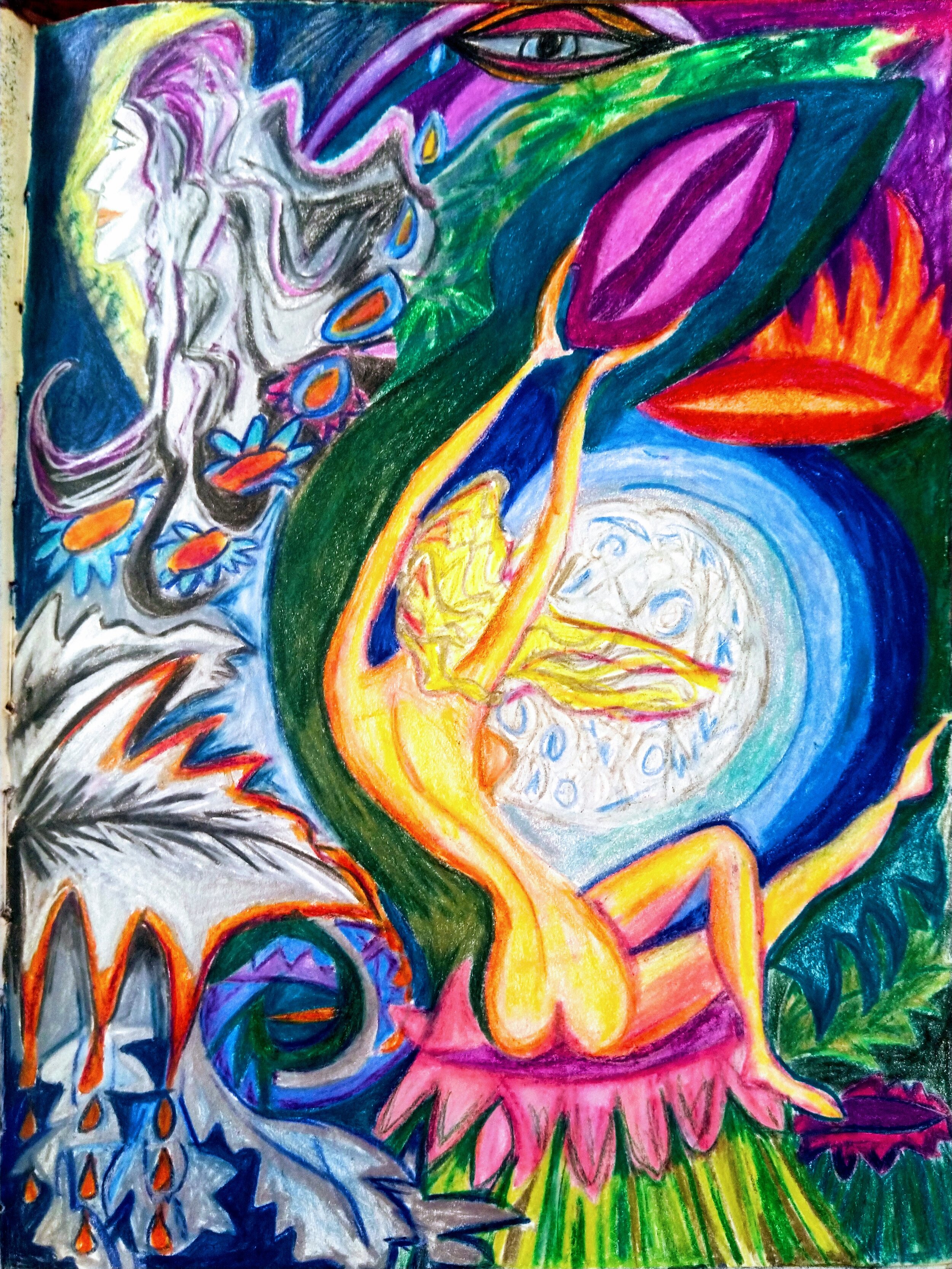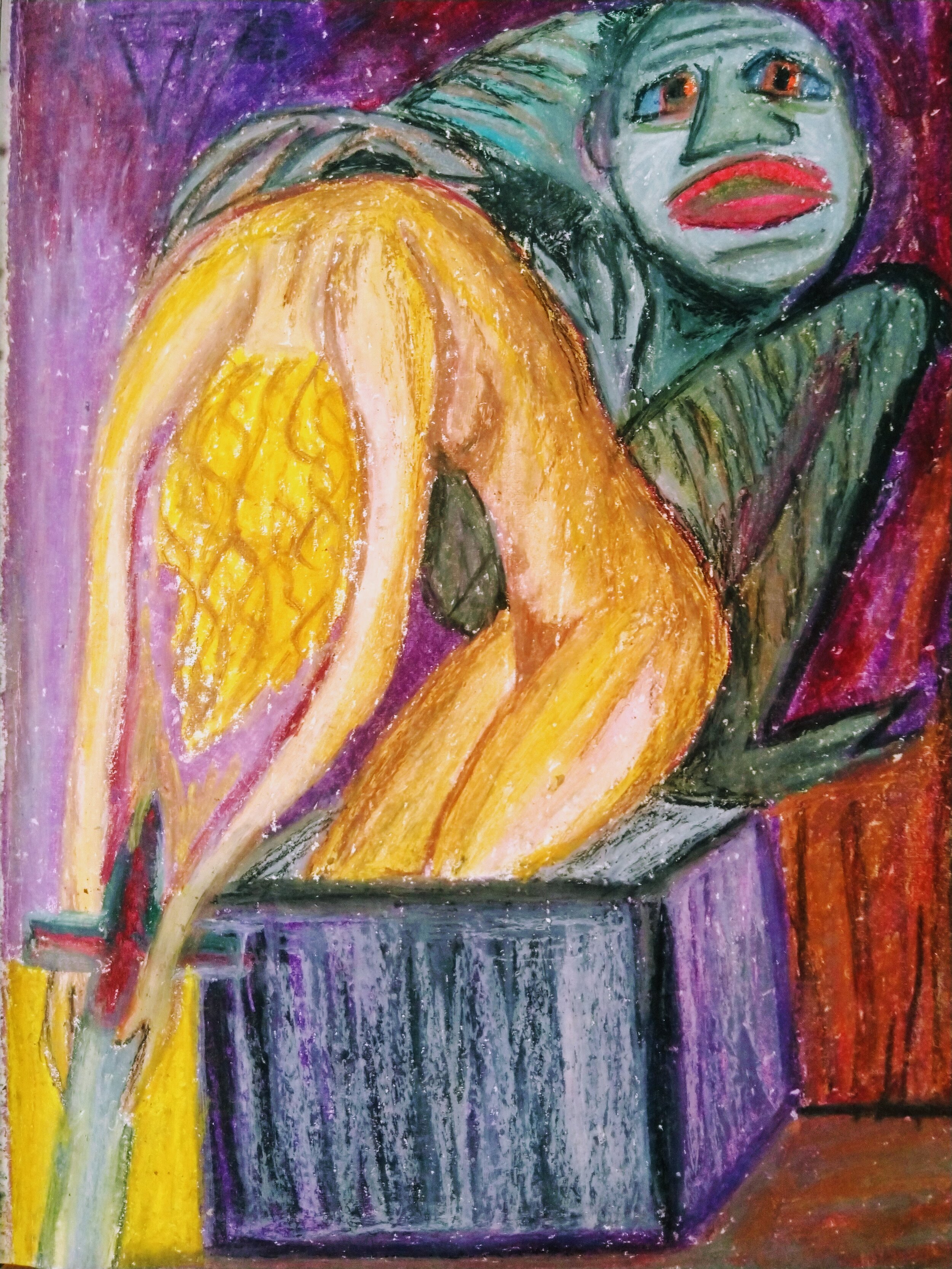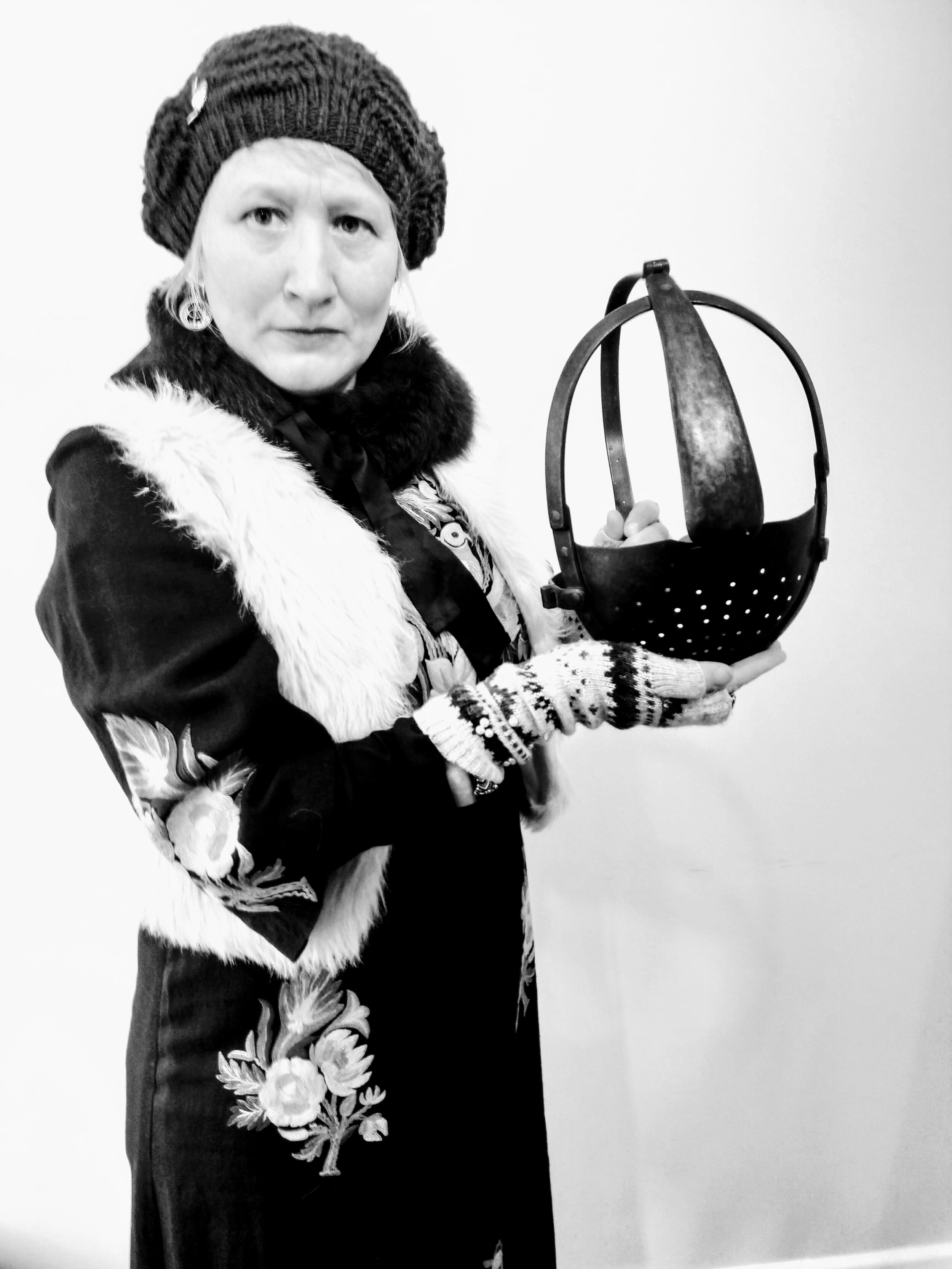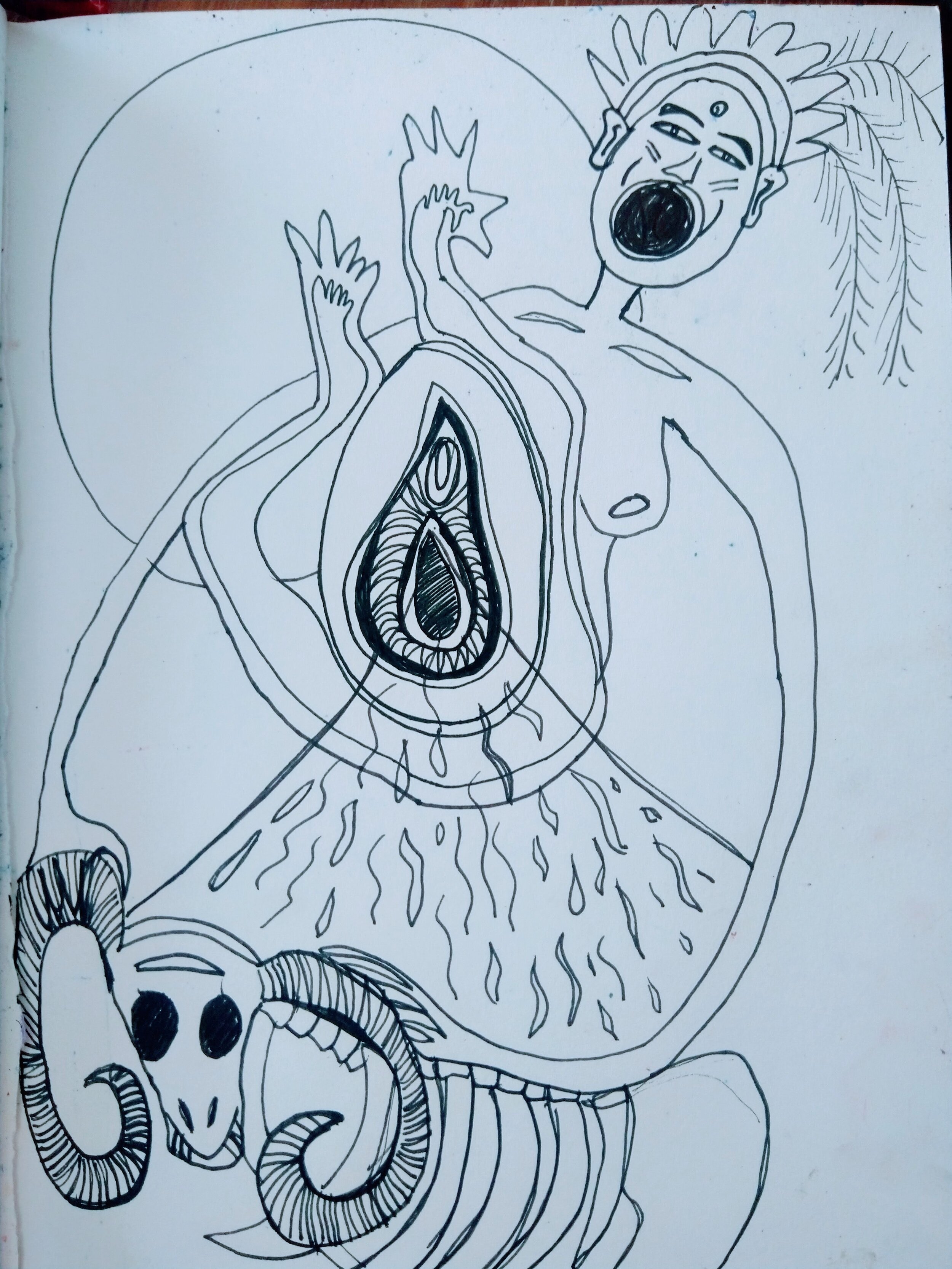Red Bead Speech II - On Voice
As a child my voice fought to be heard amidst the din of a loud, opinionated family. When the clan gathered, it was with a cacophony of sound. Within that setting I had to develop a strong vocal tone to be heard. My voice now carries across open plan offices, cuts through the babble of a crowded pub, and it can throw itself from the stage to the back of the balcony.
I was born into the world asking questions. I’d wear my mother out with my young curious voice. Often left to amuse myself after my much older siblings had left home, I would tell myself stories, speaking them outloud to my bear, my tiger, the fairies underneath my grandparents’ willow tree, and my invisible dog who I know was and is my wolf. My voice has gotten louder as I have gotten deafer with age.
Angry voice
Many times people have attempted to silence my voice. Mainly men. Especially my angry voice. Men don’t like an angry woman - so they often seek to shut her up; to close off her power by closing her mouth. The scold’s bridle was an implement of torture designed by men to silence a woman. When I was returning from the School of Myth weekend in December 2019, where we had heard the tale of Red Bead Woman, I came across a 17th Century scold's bridle in an auctioneers front window in Wimborne, Dorset. As I held its cold iron frame, I felt sick to the stomach from the trauma that I could sense was still caught its metal.
As a woman, I find it so disempowering to be told to be silent by a man. Our voices raised in anger become a threat to the masculine, but it is even more frustrating and disenfranchising when male behaviour has given rise to that anger in the first place. I remember the great release when I finally shouted at a man who was a great silencer. In my total anger I let rip, voicing my disgust at his deep betrayal, before turning on my heal and walking away, leaving him finally speechless. I have vowed never to be silenced by a man again.
Singing voice
I love to sing. My singing voice led me to school musicals, a production of the Mikado where my choral partner was Roger Black, later to become a famous runner. I loved belting out those Gilbert and Sullivan songs, in which my voice, with rehearsal, was good enough. My voice isn’t trained though, and because of endless put downs (again by men) for not always hitting the right note, I still catch myself apologising before I start to sing. However, in recent years I’ve realised I have a strong earthy voice, and am learning to work within its range. I can hold a call or a cry for a long time, especially when chanting runes with my drum. The power in my voice is revealing itself.
I’m exploring the art of lamentation too - the old tradition of releasing grief through voice with wailing and chanting. This is powerful and cathartic work, much needed in these times.
I remember my grandmother who was always singing to me as a child. I’d sing with her happy, jolly tune.
Shy voice
I remember as a teenager I could not always find words easily and went through what felt like a period of muteness. From being a confident bright young child, puberty and a loss of innocence made me anxious and shy. I was lost for words when out with older peers on the new wave music scene, my shyness using cigarettes as a prop to fill awkward silences. I think of the damage that would have done to my vocal chords.
I carried that shyness into university where, amongst all these seemingly sophisticated media kids down from London, I felt like a shy extrovert except in class, when I was as ever, eager to ask questions, debate and challenge. Until the one time in a large conference I was overcome by terror, and was unable to ask the expert panel a question, worried that it would appear foolish or not valid. Then someone else asked the same question. Now I always say to the young students and graduates I mentor - no question is a foolish question...don’t be afraid to ask.
Teaching voice
Throughout my career I've used my voice as a communicator. Early in my career I was an English language teacher, standing in front of a class of highly excited teenagers, barely out of my teens myself, trying to get them to grips with the finer points of English pronunciation and grammar. As a child I was humiliated in junior school by a teacher when through nerves I clammed up during a presentation to class. I had an attack of stage fight, to be repeated later in life on stage in a play. I still recall that sense of complete and utter horror of my mind going blank and wanting the earth to open and swallow me whole.
The teacher thought I hadn’t done the homework to prepare and scolded me in front of my peers . I was 10 years old and could feel the heat burning my cheeks, and the tears welling up. Now, here I was in front of the class teaching English as a second language - using my voice to share knowledge and help others think and learn. That teaching skill took me to Java and the many adventures I had there.
Campaigning voice
I entered the world of social work and disability rights advice, using my voice to challenge inequality, to champion disability rights and to empower others to fight for their rights - in doing so I was empowering myself. At a day centre for severely disabled people - some of whom were elective mutes, or whose language and vocal expression was limited, I used my voice to tell stories and myths, enabling my clients to express their voice through musical accompaniment and created sounds to bring the story to life.
I went on to become a professional communicator, pushing myself to give public talks (despite inner fear) to professionals, and argue to finer points of pension regulation on the phone to journalists from national media, in the height of the pensions crisis in the early 2000s.
On reflection, I’ve had a long career where my voice has been trained to question and challenge. Only after switching industries, in a move to higher education, did I become aware how archaic, hierarchical structures can disempower workers' voices through fear. My honed skill to ask questions, and constructively challenge decision-making not based on clear evidence or research, upset colleagues who had become fearful working in such a parent child, fear-based environment. To be ‘out spoken’ in such an environment was not deemed acceptable by some, so again I felt my voice was being put down through small acts of passive aggression, as I tapped into or reflected colleagues' fears. Rather than sit back, I joined a project to tackle this fear based system, again using my voice as a force for change.
On muteness
As a sensitive child, I could easily get upset, and my sobs could turn into hyperventilation as I struggled to breathe, escalated by an overbearing father who was not naturally empathetic, who would try to mute my vocal expression of hurt and pain. This set a response pattern of muteness in trauma. I can see that played out through my life, my voice becoming unsteady and uncertain to the point of becoming silent. After my son was stillborn, my voice became a stammer, I could feel my inability to find words; or rush to speak, and trip over my words...perhaps because my inner voice was wailing with such intensity, so deeply. The cry of a grieving mother is the cry of the earth herself, yet our society has lost the skills to support that cry of grief. So I come back to the art of lamentation as a much needed vocal expression of deep pain. This is where I feel my work is starting to stitch together - a weave of story and creating a place for grief to be able to howl out loud.
In my own dismemberment through a dark night of the soul, through an extended breakdown that became a necessary breakthrough, I again became mute. Through piecing myself back together in a long and at times difficult climb out of that silent darkness, where only demons could be heard, my voice has found a new clarity, a new strength, a new sight and a new set of truths.
My voice now holds the voice of the storyteller; the voice of the poet; the voice of my ancestors and adopted ancestors whose voices I hear still echoing in the place of their trauma, waiting to be cleared. My voice is becoming a voice of healing, not only for myself but for others too.
Stepping into the sovereignty of my voice has been a truly liberating experience, and for that I am eternally grateful.
Read Red Bead Speech I - Red Bead Woman
Images below created in my early 20s, in a resdiscovered notebook. Plus the horror of holding a 17th Century scold’s bridal.



